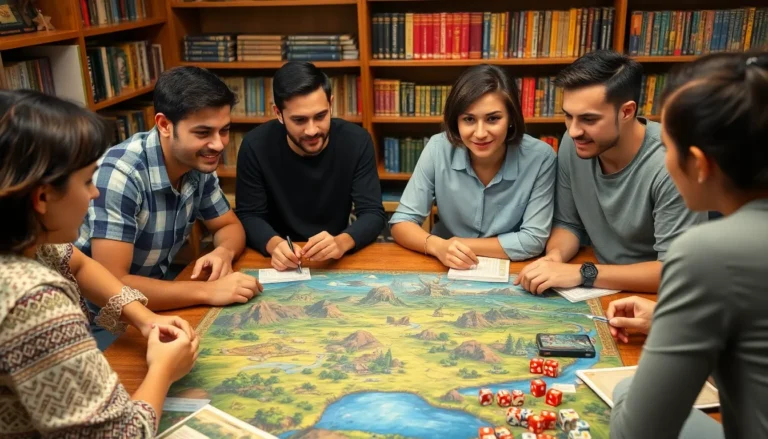Table of Contents
ToggleRPG strategy blends the thrill of role-playing games with tactical decision-making, creating a unique gaming experience. Players dive into immersive worlds where they not only craft their characters but also devise intricate plans to overcome challenges. This combination of storytelling and strategy captivates gamers, encouraging them to think critically and adapt their tactics.
In RPG strategy, every choice matters. From character development to resource management, players must navigate complex systems to achieve their goals. Whether it’s forming alliances or battling formidable foes, the strategic elements elevate the gameplay, making it both engaging and rewarding. As the popularity of RPGs continues to rise, understanding the nuances of strategy becomes essential for players looking to master their adventures.
Overview of RPG Strategy
RPG strategy combines immersive storytelling with tactical planning, allowing players to navigate complex worlds. Players create unique characters, each with specific abilities and strengths. This character creation sets the foundation for strategic gameplay.
Strategic decision-making plays a vital role in shaping the game’s outcome. Choices in skill allocations, character classes, and equipment significantly impact overall effectiveness. Players assess risks when forming alliances, managing resources, and engaging in combat scenarios.
Resource management often determines success in RPGs. Players allocate health points, mana, and other resources wisely during quests and battles. Efficient resource management leads to stronger characters and improved chances of overcoming challenges.
Character development also relies on strategic choices. Players select skills and abilities as they progress, leading to diverse playstyles. Customization adds depth, allowing players to tailor their characters to specific strategies, enhancing gameplay.
The importance of tactical combat cannot be overstated. Players analyze enemy weaknesses and adapt strategies accordingly. Understanding terrain advantages and utilizing varying attack styles enhances combat efficiency.
RPG strategy encompasses various elements, including character creation, resource management, and tactical combat. Familiarity with these components leads to a more engaging and successful RPG experience.
Key Elements of RPG Strategy

RPG strategy relies on several key elements that enhance gameplay and player engagement. Character development and tactical gameplay are crucial for optimizing performance in immersive worlds.
Character Development
Character development centers around creating unique identities within the game. Players select character classes, which define attributes and abilities, leading to distinct playstyles. Skills must be allocated thoughtfully to complement specific strengths, enhancing effectiveness in battles. For instance, a mage may benefit from maximizing intelligence and spell-casting skills, whereas a warrior should focus on strength and durability.
The process of leveling up allows characters to gain experience points (XP), which unlocks new abilities and enhances existing ones. Strategic choices in equipment selections, armor types, and weapon preferences further contribute to character growth. Players also shape their characters’ narratives through interactions and decisions, providing a rich, personalized gameplay experience.
Tactical Gameplay
Tactical gameplay involves analyzing combat scenarios and making calculated decisions. Players assess enemy weaknesses, character strengths, and available resources to devise winning strategies. Elements such as battlefield positioning and the timing of abilities are critical factors in gaining advantages during encounters.
Players must consider team compositions to maximize synergy among characters. For example, a balanced party might include a healer, a frontline tank, and damage dealers to address various combat challenges.
Effective use of resources, including health points and mana, can turn the tide of battle. Players often encounter scenarios where strategic retreats or feints lead to greater success. Lastly, adapting to opponents’ tactics and learning from past encounters form the backbone of competitive play, allowing for continuous improvement in strategy execution.
Popular RPG Strategy Games
RPG strategy games offer a unique blend of immersive storytelling and tactical gameplay. Here are two popular titles that exemplify these elements.
Game 1: Overview and Features
Game Title: Fire Emblem: Three Houses
Fire Emblem: Three Houses combines strategic combat with deep character interactions. Players assume the role of a professor at a military academy, shaping the destinies of their students. The game features:
- Tactical Combat: Grid-based battles require players to analyze terrain and unit strengths.
- Character Development: Players build relationships with students, influencing their skills and motivations.
- Multiple Storylines: Choices lead to various narrative paths, enhancing replayability.
Game 2: Overview and Features
Game Title: Divinity: Original Sin 2
- Cooperative Gameplay: Up to four players can team up, allowing for collaborative strategies.
- Dynamic Environments: Players can use the environment to their advantage, manipulating terrain during combat.
- Custom Character Creation: Extensive character customization leads to diverse playstyles, from stealthy rogues to powerful mages.
Tips for Mastering RPG Strategy
Effective RPG strategy requires careful planning and decision-making. Players can enhance their gameplay by focusing on team dynamics and resource allocation.
Building Your Team
Building a strong team involves selecting characters with complementary abilities and skills. Players should:
- Diversify Class Types: Incorporate various character classes to balance offense, defense, and support roles. A well-rounded team enhances adaptability in combat.
- Enhance Synergy: Choose characters that synergize, utilizing abilities that amplify one another. For example, combining a tank class with damage dealers maximizes offensive potential.
- Assess Character Strengths: Understand each character’s unique strengths and weaknesses. This understanding enables players to exploit enemy vulnerabilities effectively.
- Adapt to Encounter Types: Modify team composition based on specific scenarios. For instance, prioritize magic users against heavily armored foes, while physical attackers might excel against weaker opponents.
Resource Management
Resource management plays a crucial role in maintaining strength throughout the game. Players should focus on these key aspects:
- Monitor Health and Mana: Keep track of health points and mana reserves during gameplay. Avoid depleting resources early in encounters to ensure longevity in battles.
- Prioritize Item Usage: Use consumables strategically. Save healing potions and buffs for crucial moments to maximize their impact.
- Balance Upgrades: Allocate resources to upgrade skills and equipment evenly. Avoid focusing solely on one character or ability, as diverse upgrades lead to a more balanced team.
- Evaluate Cost vs. Benefit: Assess the effectiveness of each action taken against resource consumption. Every decision should enhance the likelihood of success without overextending resources.
By focusing on these fundamental aspects—team building and resource management—players can greatly improve their RPG strategy and overall gameplay experience.
Mastering RPG strategy requires a keen understanding of character development and tactical gameplay. Players who effectively manage resources and make thoughtful decisions can enhance their gaming experience and achieve greater success. The intricate balance between team composition and strategic planning is vital for overcoming challenges and maximizing enjoyment.
As RPGs continue to evolve and attract new players, embracing these strategies will not only improve gameplay but also deepen the immersive experience. With a focus on adaptability and synergy among characters, players can navigate the complexities of their chosen worlds. Ultimately, a well-crafted RPG strategy can transform any adventure into a memorable journey.






